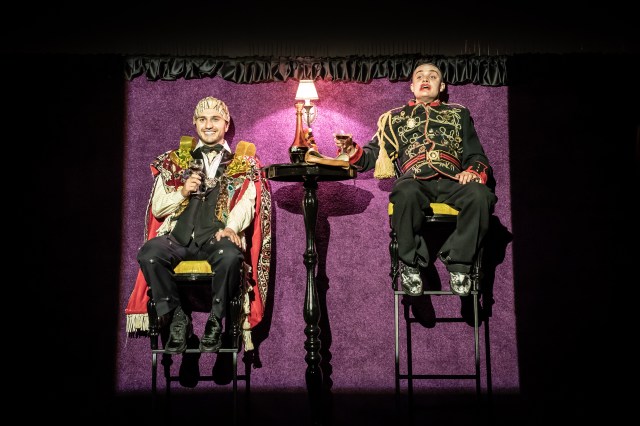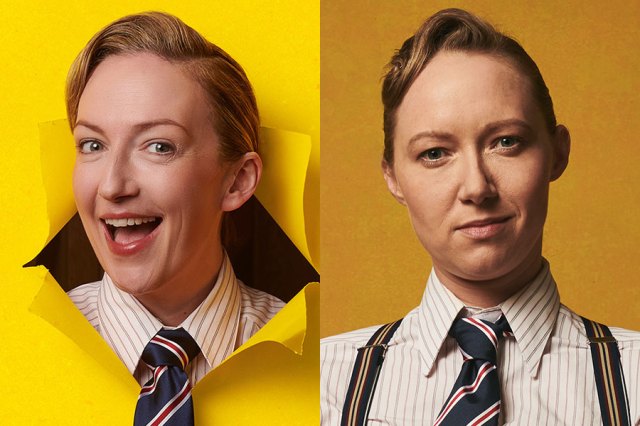The Flea at the Yard Theatre – review
James Fritz’s genre-defying, queer play runs until 18 November

Inspired by the 1889 Cleveland Street scandal where a gay brothel was raided and closed down amid allegations that one of Queen Victoria‘s grandsons was a patron, and revelations that most of the rent boys were procured postal workers, James Fritz’s new piece is simultaneously a play and a crazy queer vaudeville. It examines how far we’ve come, while finding some timeless resonances (if you were a mother desperately trying to keep a roof over your family’s heads, how deeply would you inquire when your son starts bringing home extra shillings above his meagre post office wages?).
Fritz’s rollicking script has an overlong first half, lurching enjoyably if bewilderingly into such disparate areas as police drama, history lesson, family saga and sheer farce. However, it really gets into its stride in a rambunctiously good second act that features a surreal meeting between Queen Victoria and God (no, really), and a surprisingly moving conclusion to the plot strand revolving around a working-class mother and the gay son she inadvertently betrays. Overall, it’s a chipped-nail-lacquered two-finger salute to the art of formal play-making but it has an originality and rawness that compels.
Anyone who saw Mark Ravenhill’s 2001 National Theatre hit Mother Clap’s Molly House, which dealt with a similar time period and milieu, will find this familiar, although Fritz’s work is messier and more emotionally charged. The title derives from a story told at the outset by Bermondsey seamstress Emily Swinscow (Norah Lopez Holden) of a flea jumping on a rat, whose reaction upsets a horse, which then kills a human, thereby setting in motion the course of the play, which duly jumps around in tone and style, as the titular pest leaps between hosts.
The Yard’s artistic director Jay Miller matches Fritz with a grotesquerie-stuffed production where Punk meets Python (Monty): unruly, funny, rough around the edges but shot through with moments of real beauty. There’s a Dali-esque quality to Naomi Kuyck-Cohen’s crimson and black set, with unfathomably long-limbed chairs and tables ranged high up on the back wall giving the characters the illusion of hanging in mid air, or where Queen Victoria can float imperiously above her subjects aboard a Grecian pillar painted black. There’s a tiny gilt plush chaise longue and armchair whose scale turns the pompous, pontificating aristocrats perched atop them into monstrous, roaring, self-regarding children. A suburban-looking front door, garishly painted in tune with the rest of the set, leads out of this seedy but safe cocoon of fabulousness, to the brutal London streets, or to Newgate Jail.
The gorgeous shabby chic costumes of Lambdog1066 wouldn’t have looked out of place on the dance floors of the Blitz or the Mud Club back in the day: Police uniforms are studded all over with buttons, a voluminous ruched sleeve transforms one side of an otherwise conventional man’s outfit into something unexpectedly camp, a floor rug topped with scallops of plastic becomes a cape for a member of the nobility. It all adds to an overriding sense of make-do-and-mend hedonism that captures an essence of opulence and danger.
The performances match the random, unpolished nature of the production but each of the five actors has several impressive moments across multiple roles. Although touching and engaging, Norah Lopez Holden feels decades too young to be the mother of a grown-up son, yet, ironically, is absolutely brilliant as a comically repressed, perennially indignant Queen Victoria, softening hilariously after an orgasmic encounter with the Almighty. Scott Karim is great fun doubling up as a sunglasses-sporting deity and the high-ranking policeman forever smarting in shame at being the copper who let Jack the Ripper get away.
Connor Finch brings a Bowie-like swagger to a local bad boy caught up in recruiting fresh meat for the brothel, and finds a seam of lovelorn feeling and sweaty desperation under the foppish veneer of Lord Arthur Somerset, the Prince of Wales’ equerry embroiled in scandal. An equally impressive Séamus McLean Ross is alarmingly funny as a wired, clownish Prince and then almost unrecognisable as Emily’s gentle, emotionally damaged son. Sonny Poon Tip contrasts nicely between a happily gay aristocrat whose applecart of contentment is upset by the controversy, and a policeman with a bit of a conscience.
The gear changes between cartoon-like buoyancy and deadly serious are abruptly done, and it’s not clear if that’s down to directorial intention or a lack of rehearsal time. The pace ranges from frantic to lackadaisical with little in between, although an excruciating tea party between Victoria and Prince Bertie at the top of act two is a notable exception to this, achieving a rich and rare comic perfection. Flawed as The Flea is, it’s refreshing to encounter a new play so ambitious, imaginative, and unashamedly unfettered by convention.
















